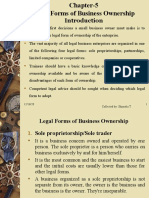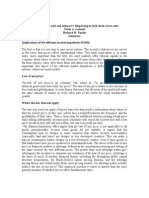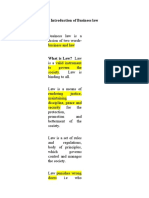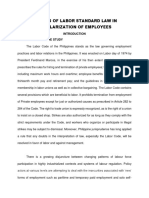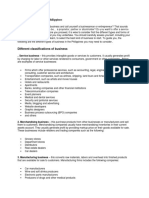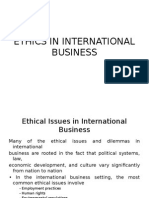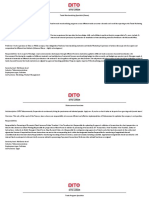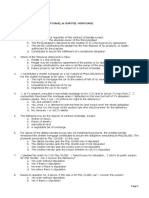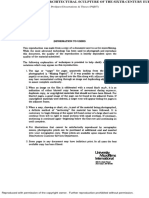0 ratings0% found this document useful (0 votes)
182 viewsAnsa Maria P.R S5 DCP, Roll No: 13 Government. Women's Polytechnic College Nedupuzha
Ansa Maria P.R S5 DCP, Roll No: 13 Government. Women's Polytechnic College Nedupuzha
Uploaded by
ചിരിച്ചു ചിരിച്ചു മടുത്തുBusiness law establishes rules and regulations for commercial activities and disputes. It governs key aspects of operating a business like starting, managing, buying, and closing a business. Business law also establishes standards of conduct and protects rights and liberties in business relationships. It includes areas like contracts, corporate law, intellectual property, taxation, and employment law. The overall purposes of business law are to maintain order, resolve disputes, and protect business and consumer rights.
Copyright:
© All Rights Reserved
Available Formats
Download as PDF, TXT or read online from Scribd
Ansa Maria P.R S5 DCP, Roll No: 13 Government. Women's Polytechnic College Nedupuzha
Ansa Maria P.R S5 DCP, Roll No: 13 Government. Women's Polytechnic College Nedupuzha
Uploaded by
ചിരിച്ചു ചിരിച്ചു മടുത്തു0 ratings0% found this document useful (0 votes)
182 views26 pagesBusiness law establishes rules and regulations for commercial activities and disputes. It governs key aspects of operating a business like starting, managing, buying, and closing a business. Business law also establishes standards of conduct and protects rights and liberties in business relationships. It includes areas like contracts, corporate law, intellectual property, taxation, and employment law. The overall purposes of business law are to maintain order, resolve disputes, and protect business and consumer rights.
Original Title
BUSINESS LAW
Copyright
© © All Rights Reserved
Available Formats
PDF, TXT or read online from Scribd
Share this document
Did you find this document useful?
Is this content inappropriate?
Business law establishes rules and regulations for commercial activities and disputes. It governs key aspects of operating a business like starting, managing, buying, and closing a business. Business law also establishes standards of conduct and protects rights and liberties in business relationships. It includes areas like contracts, corporate law, intellectual property, taxation, and employment law. The overall purposes of business law are to maintain order, resolve disputes, and protect business and consumer rights.
Copyright:
© All Rights Reserved
Available Formats
Download as PDF, TXT or read online from Scribd
Download as pdf or txt
0 ratings0% found this document useful (0 votes)
182 views26 pagesAnsa Maria P.R S5 DCP, Roll No: 13 Government. Women's Polytechnic College Nedupuzha
Ansa Maria P.R S5 DCP, Roll No: 13 Government. Women's Polytechnic College Nedupuzha
Uploaded by
ചിരിച്ചു ചിരിച്ചു മടുത്തുBusiness law establishes rules and regulations for commercial activities and disputes. It governs key aspects of operating a business like starting, managing, buying, and closing a business. Business law also establishes standards of conduct and protects rights and liberties in business relationships. It includes areas like contracts, corporate law, intellectual property, taxation, and employment law. The overall purposes of business law are to maintain order, resolve disputes, and protect business and consumer rights.
Copyright:
© All Rights Reserved
Available Formats
Download as PDF, TXT or read online from Scribd
Download as pdf or txt
You are on page 1of 26
Submitted By
Ansa Maria P.R
S5 DCP,Roll No: 13
Government. Women’s polytechnic
college Nedupuzha.
•WHAT IS BUSINESS LAW?
•INTRODUCTION
•MEANING
•BUSINESS LAW-DEFINITION:
•NATURE OF BUSINESS LAW
•BRANCHES
•LEGAL ISSUES IN COMMERCIAL LAW
•IMPORTANTS
•PURPOSES AND OF BUSINESS LAW
•FUNCTIONS OF BUSINESS LAW
•TYPES OF BUSINESS LAW
•SOURCES OF BUSINESS LAW
•OBJECTIVES OF BUSINESS LAW
•REQUIREMENTS OF BUSINESS LAW
•CONCLUSION
WHAT IS BUSINESS
LAW?
Business law is that portion of
the legal system which
guarantees an orderly conduct
of business affairs and the
settlement of legitimate
disputes in a just manner. It
establishes a set of rules and
prescribes conduct to order to
avoid misunderstandings and
injury in our business
relationships.
INTRODUCTION
Business comprises all profit seeking activities
and enterprises that provide goods and services necessary
to an economic system. Law refers to the principles and
regulations established by a Government ,applicable to
people and enforced by judicial decision. Business Law is
also known as Commercial law or corporate law, is the body
of law that applies to the rights, relations, and conduct of
persons and businesses engaged in commerce,
merchandising, trade, and sales.
MEANING
Law is a system of rules that are created and
enforced through social or governmental institutions to
regulate behaviour. Commercial law or business law is the
body of law which governs business and commerce and is
often considered to be a branch of civil law and deals both
with issues of private law and public law. Commercial law
regulates corporate contracts, hiring practices, and the
manufacture and sales of consumer goods.
BUSINESS LAW-
DEFINITION:
Business law is defined as” Business
law encompasses all of the laws that dictate how to form
and run a business. This includes all of the laws that govern
how to start, buy, manage and close or sell any type of
business. Business laws establish the rules that all
businesses should follow.”
NATURE OF BUSINESS
LAW
The nature of business law depends on the
location of the business and its area of activities. Apart
from these two conditions governance authority also affects
the nature of the law. The main areas included under the
business law are:
Starting a business
Taking over/ buying a business
Managing a business
1. Starting a Business
The business laws are applicable to all types of
business organizations. There are certain rules for each
business entities including corporations, limited liability,
partnership and more. For instance, let’s assume you want
to start a business but what type of business it would be?
And what papers you need to file for it? After this what are
the certain legal rules you need to follow or how to pay the
taxes? To answer all this question you need to hire a
business lawyer. The hire lawyer can help you with
intellectual property law which includes patents,
copyrights, trademarks and other intangible assets.
2.Taking Over/ Buying a Business
Now, not everyone starts with buying a
business some goes for taking over or buying an existing
one. When it comes to buying or taking over an existing
business the company need a lawyer to deal with contracts,
employment laws, real estate laws and consequences after
the breach of contract.
3. Managing a Business
Running a business is not an easy task as there
are several aspects that are involved in managing a
business. As you already read mention a business involves
lots of contracts, joint-ventures and employment laws. The
government of the country create and enforce the federal
laws on the business.
BRANCHES
Contract Law: Contract law seeks to regulate the formation and
enforcement of contracts. It sets out the essential elements of a valid
contract and the remedies available to parties in the case of a breach of
contract.
Property Law: This law governs the transactions pertaining to
different types of property. Although it mainly includes sale, transfer,
lease, and rental of immovable property.
Business Regulations: This set of law covers government rules and
regulations for business organizations, factories, trade unions, and
labour.
Corporate Law: Corporate law deals with formation, management,
and termination of corporations. It sets out legal provisions for issues
such as election of directors, raising of capital.
Intellectual Property Law: This is an umbrella law that provides for
patenting of inventions and copyrighting of creative work.
Tax Law: Tax law covers government levy of direct and indirect taxes
on business transactions. Primary types of taxes include income, sales,
excise, gift, capital gain, and profit distribution taxes.
LEGAL ISSUES IN
COMMERCIAL LAW
All commercial and business laws are associated with
different types of the legal issues. The most common
among them is the violation of contracts. In addition to
this, there are several other issues such as advertising
disputes, marketing term violation, unfair trade practices,
deficiency in service, consumer complaints, and leakage of
trade secrets.
Sometimes, a contract between two parties may affect the
rights of someone else who is not a party to the contract.
Similarly, sometimes, a dispute may involve more than one
law. Commercial law helps in resolving such complex
issues as well.
IMPORTANTS
The prime purpose of business law is to maintain order,
resolve disputes, establish generally accepted standards, protect rights
and liberties when it comes to business and its relation to other
businesses, government authorities, and the customers.
A Universal set of standards
Maintenance of Equilibrium
Less chances of frauds
Presence of Ethical conduct
To maintain order among businesses, brands, and companies alike
Protect the rights of the company
PURPOSES OF BUSINESS
LAW
Establishing standards identifies what types of behaviour
are and are not accepted in society. For example, damage to
person or property is considered a crime because it is not
tolerated by society.
Maintaining order.
Resolving disputes allows for the mitigation of issues that
arise between those with different wants, needs, views,
and/or values.
Protecting liberties and rights
FUNCTIONS OF BUSINESS
LAW
Legal basics such as ethics, court system structure, substantive law, and
procedural law are foundational.
Contract law includes drafting, rights assignment, work delegation,
transactions, agreements, breach of contract, and remedies for a
breach.
Intellectual property law (IP), including trademarks and patents,
prevents others from profiting from your ideas and creations.
Corporate law governs the formation of corporations and sale of
corporate equities.
Tax law determines how different types of businesses are taxed.
Employment law governs how employers interact with their employees
and the rights and responsibilities of each, minimum wage law,
workplace safety, and overtime rules.
Business organization laws define major business entities, such as
partnerships, limited liability companies, sole proprietorships, and
corporation.
Property law governs personal and real property.
Negotiable instruments law includes governance of secured
transactions and bankruptcy.
TYPES OF
BUSINESS
LAW
• Contracts
• Securities law
• Antitrust
• Commercial paper
• Pensions& benefits
• Immigration law
• Employment law
• Law of corporations and
other business law
• Intellectual property
• Secured transactions
• Income tax
• Trusts & law
• labour law
• bankruptcy
1. Contracts: A contract is a legally binding document that
recognizes and governs the rights and duties of the parties to the
agreement. A contract typically involves the exchange of goods,
service, money, or promise of any of those.
2. Securities law:
The term security is usually applied to a deposit, lien, or mortgage vo
luntarily given by a debtor to a creditor to guarantee payment of a de
bt. the body of laws governing the issuance and selling of securities.
3. Antitrust: Antitrust laws are regulations that monitor the
distribution of economic power in business, making sure that
healthy competition is allowed to flourish and economies can grow.
4. Commercial paper: Commercial paper is a commonly used
type of unsecured, short-term debt instrument issued by
corporations, typically used for the financing of payroll, accounts
payable and inventories, and meeting other short-term liabilities.
5. Pensions& benefits: Benefit pensions pay out a secure income for
life which increases each year. You might have one if you've worked for a large
employer or in the public sector. Your employer contributes to the scheme and is
responsible for ensuring there's enough money at the time you retire to pay
your pension income.
6. Immigration law: Immigration law refers to the
national statutes, regulations, and legal precedents governing immigration into
and deportation from a country.
7. Employment law: Employment law is a broad area of the law. In
general, this area governs the employer-employee relationship.
8. Law of corporations: Corporate law is the body
of law governing the rights, relations,
and conduct of persons, companies, organizations and businesses.
9. Intellectual property: Intellectual property (IP) refers to
creations of the mind, such as inventions ;literary and artistic works;
designs; and symbols, names and images used in commerce.
10. Income tax: Income tax is a type of tax that governments
impose on income generated by businesses and individuals within
their jurisdiction.
11. Secured transactions:
A secured transaction is a transaction that is founded on a security agree
ment. A security agreement is a provision in a business transaction in wh
ich the debtor, in the agreement gives to the creditor the right to own pr
operty owned or held by the debtor. This property, called collateral.
12.Trusts & law: Trusts are established to provide legal protection
for the trust or's assets, to make sure those assets are distributed
according to the wishes of the trust or, and to save time, reduce
paperwork and, in some cases, avoid or reduce inheritance or estate
taxes.
13.labourlaw: Labour law, the varied body of law applied to such
matters as employment, remuneration, conditions of work, trade
unions, and industrial relations. In its most comprehensive sense,
the term includes social security and disability insurance as well.
14.Bankruptcy: Bankruptcy is a legal proceeding involving a
person or business that is unable to repay their outstanding
debts. The bankruptcy process begins with a petition filed by
the debtor, which is most common, or on behalf of creditors, which
is less common.
SOURCES OF BUSINESS
LAW
The important sources of business law are : (1) Legislation, (2) Custom,
(3) Case law, (4) Natural law, and (5) English law (see Fig. 1.2).
SOURCES:
Customs: A substantial part of business law is customary, not
withstanding advances made in science and technology. This is true
both in developed and developing countries. A custom, when accepted
by courts and incorporated in judicial interpretations, becomes a law
Case law.
Natural law : Natural law or natural justice is another source of law.
The natural justice that no man can be punished twice for the same
crime is a guiding principle for any legislation.
English law: Our business laws are largely based on English acts
applicable in England. Our Sale of Goods Act, for instance, has been
taken directly from the English Sale of Goods Act.
Legislations: Legislation is the common source of law. Both
Parliament and State assemblies have enacted a number of legislations
that cover various aspects of business.
OBJECTIVES OF
BUSINESS LAW
To explain the framework within which business activities shall be
carried out.
To raise an issue to various legal and semi-legal authorities against the
government in case the legal rights of the business have been violated.
Some business law are made to encourage business persons to achieve
their goals fast.
The business law also has social objective to serve the society at large.
The anti-competition laws, pollution control laws etc...
Business law tries to prevent the concentration of economic power to
some extent and helps in the fast settlement of claims of individuals
against business houses.
REQUIREMENTS OF
BUSINESS LAW
Following are the requisites of effective legal rules influencing business:
1. Rules Must be Obeyed Voluntarily : The primary
objective of a legal system is to set forth guidelines for human
conduct that will cause people to behave in the way society wants
them to behave. This is the “preventive” function of law.
2. The Rules Must be Just and Reasonable :Popular
belief is that people comply with the law out of fear of prosecution,
as a force of habit, or out of a feeling that doing so is right.
3. The Rules Must be Flexible : Since the material
circumstances of community life, and with them the values and
attitudes of the community are continually changing, the system of
rules under which the community lives must be flexible and
adaptable.
4. The Rules Must be Knowable :If the community expects
its members to comply with the legal rules, they must know what the
rules are. It is obviously not necessary for every citizen to know all
the rules, though the popular dictum is: “ignorance of law is no
excuse.”
CONCLUSION
Therefore we see that laws are affecting business in
numerous ways. Laws protect the business men as
well as the customers which is essential to have a
good relation between these two parties otherwise
business firms will not run. Laws are necessary to
incorporate a business firm, to run a business firm
and to dissolve it. Business laws and analysis enables
businesses to make better decisions . better decisions
ultimately lead to a more successful organisation and
greater profits.
THANK YOU
You might also like
- Cases and Materials On Contracts 6th WaddamsDocument909 pagesCases and Materials On Contracts 6th WaddamsheynickletsgoNo ratings yet
- Workshop Questions Chapter 5Document6 pagesWorkshop Questions Chapter 5Ng Peng LiangNo ratings yet
- What Are The Main Responsibilities of Managers - TelegraphDocument5 pagesWhat Are The Main Responsibilities of Managers - Telegraphulhas_nakasheNo ratings yet
- Free TradeDocument9 pagesFree Tradeapi-263291630No ratings yet
- Abs CBN Shutdown IssueDocument2 pagesAbs CBN Shutdown IssueOmar Marangit100% (1)
- Chapter - 5 Legal Forms of Business OwnershipDocument19 pagesChapter - 5 Legal Forms of Business OwnershipJabesa A. BedasaNo ratings yet
- Business Law Lecture 1 & 2Document15 pagesBusiness Law Lecture 1 & 2hamza younasNo ratings yet
- Legal Aspects of Business Transactions: A Complete Guide to the Law Governing Business Organization, Financing, Transactions, and GovernanceFrom EverandLegal Aspects of Business Transactions: A Complete Guide to the Law Governing Business Organization, Financing, Transactions, and GovernanceNo ratings yet
- New in Lesson 4: Nine Abbreviated Words Called Brief Forms Short and Soft Vowel Sounds of A and e Taking Class NotesDocument25 pagesNew in Lesson 4: Nine Abbreviated Words Called Brief Forms Short and Soft Vowel Sounds of A and e Taking Class NotesAlexa Las-angNo ratings yet
- GGSRDocument14 pagesGGSRCarmela DimaalihanNo ratings yet
- Is There Such Thing As Filipino Political Thought?Document7 pagesIs There Such Thing As Filipino Political Thought?Michael Cafirma0% (1)
- Can The Market Add and SubtractDocument6 pagesCan The Market Add and SubtractSundas ArifNo ratings yet
- Ethical Issues and Problems in Business and The Corporate World - CSRDocument16 pagesEthical Issues and Problems in Business and The Corporate World - CSRRamira EdquilaNo ratings yet
- Introduction of Business LawDocument18 pagesIntroduction of Business Laweshu agNo ratings yet
- The Macroeconomic Impact of Remittances in The PhilippinesDocument46 pagesThe Macroeconomic Impact of Remittances in The PhilippinesBrian Jason PonceNo ratings yet
- Chapter 8 - Roculas, SylviaDocument22 pagesChapter 8 - Roculas, SylviaAmbray Lynjoy100% (1)
- Forms of Business OrganizationDocument6 pagesForms of Business Organizationconstancio asnaNo ratings yet
- Business Law, ModuleDocument76 pagesBusiness Law, ModuleBethi KifluNo ratings yet
- Significance of Banks and Other Financial InstitutionsDocument18 pagesSignificance of Banks and Other Financial InstitutionsIsshi Romero100% (1)
- What Is The Psychological Contract?Document16 pagesWhat Is The Psychological Contract?dedelushNo ratings yet
- Chapter 6 Wholesaling and Retailing 2Document31 pagesChapter 6 Wholesaling and Retailing 2Shamsuddoha MohammadNo ratings yet
- Importance of Law in SocietyDocument2 pagesImportance of Law in SocietyNgọc VõNo ratings yet
- Ofad 126 Lesson 1Document58 pagesOfad 126 Lesson 1Kennedy PotassiumNo ratings yet
- Good Governance (Chapter 4)Document7 pagesGood Governance (Chapter 4)Bobby GuetanNo ratings yet
- What Is Management Accounting?Document3 pagesWhat Is Management Accounting?Mia Casas100% (1)
- Commissioner v. BOAC (149 SCRA 395) :: Equivalent." It Is The Amount of MoneyDocument58 pagesCommissioner v. BOAC (149 SCRA 395) :: Equivalent." It Is The Amount of MoneyKerwin Leonida0% (1)
- Cusrel Ass.1 (2022)Document40 pagesCusrel Ass.1 (2022)Nitz MainitNo ratings yet
- Effects of Labor Standard Law in Regularization of EmployeesDocument4 pagesEffects of Labor Standard Law in Regularization of EmployeesNicole Ann MagistradoNo ratings yet
- EssayDocument3 pagesEssayDeepak MahhimkarNo ratings yet
- Project On Corporate GovernanceDocument22 pagesProject On Corporate GovernancePallavi PradhanNo ratings yet
- Financial InstitutionDocument8 pagesFinancial InstitutionankitNo ratings yet
- Divisible ContractDocument3 pagesDivisible ContractAbhijeet TalwarNo ratings yet
- Business Environment Assignemnt - 2Document20 pagesBusiness Environment Assignemnt - 2Adnan MurtovicNo ratings yet
- Presentation of Toshiba Financial ScandalDocument18 pagesPresentation of Toshiba Financial ScandalShahadat HossenNo ratings yet
- Types of Business in The PhilippinesDocument6 pagesTypes of Business in The PhilippinesBelle JizNo ratings yet
- Basic Microeconomics (BA-C 211)Document44 pagesBasic Microeconomics (BA-C 211)Rezel Funtilar100% (1)
- Anti Red Tape Act of The PhilippinesDocument8 pagesAnti Red Tape Act of The PhilippinesagrichardNo ratings yet
- Human Resource Management and Labor UnionsDocument4 pagesHuman Resource Management and Labor UnionsDavid Job Murunga100% (1)
- Good Governance and Social Responsibility Chapter 2Document3 pagesGood Governance and Social Responsibility Chapter 2Alexis50% (2)
- Republic Act No. 7042Document55 pagesRepublic Act No. 7042Prasef Karl Andres Cortes IIINo ratings yet
- Chapter 2: The External Environment: Opportunities, Threats, Industry Competition and Competitor AnalysisDocument20 pagesChapter 2: The External Environment: Opportunities, Threats, Industry Competition and Competitor AnalysisAnjali Angel ThakurNo ratings yet
- Ethics in International BusinessDocument18 pagesEthics in International BusinessAniketKaradeNo ratings yet
- Module 2 Part 2 Midterm Outline (20230328132321)Document7 pagesModule 2 Part 2 Midterm Outline (20230328132321)Janina RoseNo ratings yet
- DitoDocument42 pagesDitoHaynich WilliamsNo ratings yet
- Mini-Case Enron's Code of EthicsDocument3 pagesMini-Case Enron's Code of EthicsGarcia, Ralph Gio P.No ratings yet
- Legal Aspects Of: Doing Business in The PhilippinesDocument22 pagesLegal Aspects Of: Doing Business in The PhilippinesJohn Paul Delos ReyesNo ratings yet
- Political and Legal Factors Affecting The Impact of International TradeDocument13 pagesPolitical and Legal Factors Affecting The Impact of International TradeDARIUS KIMINZA0% (1)
- 8 92 Ab 240497 EjDocument10 pages8 92 Ab 240497 EjRainer Edyot100% (1)
- NaftaDocument8 pagesNaftaMeera HansNo ratings yet
- Chapter 14-Multinational Capital BudgetingDocument29 pagesChapter 14-Multinational Capital BudgetingDeloar Hossain SagorNo ratings yet
- Corporate Social Responsibility EssayDocument7 pagesCorporate Social Responsibility EssayZachary Samuel100% (1)
- 7 - Consumer ChoiceDocument58 pages7 - Consumer ChoiceHarshNo ratings yet
- Political EnvironmentDocument13 pagesPolitical EnvironmentChowdhury Mahin AhmedNo ratings yet
- Cooperative in The PhilippinesDocument27 pagesCooperative in The Philippinesacctg2012100% (1)
- Economic ProfitDocument11 pagesEconomic ProfitUzma AriesNo ratings yet
- Ethical Issues in Employee Employer RelationDocument10 pagesEthical Issues in Employee Employer Relationanimesh100% (1)
- Investment ManagementDocument2 pagesInvestment ManagementErika L. PlazaNo ratings yet
- Trade Restrictions: Tariff and Non-Tariff BarriersDocument42 pagesTrade Restrictions: Tariff and Non-Tariff BarriersAnqaa JalNo ratings yet
- Applicant Attraction OutcomesDocument17 pagesApplicant Attraction Outcomesspellbinder50No ratings yet
- )Document139 pages)Moon BeamsNo ratings yet
- Professional Salesmanship Notes - 1Document8 pagesProfessional Salesmanship Notes - 1Christine Joy MendigorinNo ratings yet
- AEC 45 Law On PartnetshipDocument23 pagesAEC 45 Law On PartnetshipFiona Francheska GuerreroNo ratings yet
- 2nd Outline For ContractsDocument25 pages2nd Outline For ContractsWhitney SnyderNo ratings yet
- OC (21) Nepomuceno v. Narciso - BIAGTANDocument1 pageOC (21) Nepomuceno v. Narciso - BIAGTANIanBiagtanNo ratings yet
- Module 2 PDFDocument9 pagesModule 2 PDFPoco KazureNo ratings yet
- Law On SalesDocument5 pagesLaw On SalesVictoria FayeNo ratings yet
- CTS For MC ROPADocument3 pagesCTS For MC ROPANatasha BAl-utNo ratings yet
- ABALOS, Ruth Anne Negotiable Instruments (Sec. 1 To Sec. 100)Document8 pagesABALOS, Ruth Anne Negotiable Instruments (Sec. 1 To Sec. 100)Lyannhe DilaoNo ratings yet
- Negotiable Instruments Law Reviewer - For CPA Board ExamineesDocument16 pagesNegotiable Instruments Law Reviewer - For CPA Board ExamineesGlen Ardona100% (2)
- Diamond Builders vs. Country BankersDocument1 pageDiamond Builders vs. Country BankersJinNo ratings yet
- Quiz - Pledge Mortgages PDFDocument3 pagesQuiz - Pledge Mortgages PDFKrysthel Anne CabilloNo ratings yet
- Ca$H Money Law 4 Dummies (Negotiable Instruments Law)Document14 pagesCa$H Money Law 4 Dummies (Negotiable Instruments Law)Kent ColladoNo ratings yet
- Terry - AR - The Architecture and Architectural Sculpture of The 6th-c. Eufrasius Cathedral Complex at PorecDocument570 pagesTerry - AR - The Architecture and Architectural Sculpture of The 6th-c. Eufrasius Cathedral Complex at PorecaudubelaiaNo ratings yet
- 73 Spouses Serfino V Far East Bank and Trust Company Now BpiDocument1 page73 Spouses Serfino V Far East Bank and Trust Company Now BpiAliNo ratings yet
- Credit Transactions (Palmares v. CA)Document2 pagesCredit Transactions (Palmares v. CA)Maestro Lazaro100% (1)
- Summary of ContractsDocument1 pageSummary of ContractsDang GVNo ratings yet
- Derivatives - AshifHvcDocument51 pagesDerivatives - AshifHvcadctgNo ratings yet
- QuduriDocument1 pageQudurisanoojuv783105No ratings yet
- Contract of Insurance - Classification of Contract of InsuranceDocument10 pagesContract of Insurance - Classification of Contract of Insurancesakshi lohan100% (1)
- The BExA Guide To Letters of Credit - UCP600 - Update 2007Document68 pagesThe BExA Guide To Letters of Credit - UCP600 - Update 2007MEGHANALOKSHA100% (2)
- Supplementary Lecture NotesDocument7 pagesSupplementary Lecture NotesAngelika DomingoNo ratings yet
- Commercial Lease AgreementDocument9 pagesCommercial Lease Agreementapi-568505563No ratings yet
- Lesson 11 Summary When To Use Each StrategyDocument6 pagesLesson 11 Summary When To Use Each StrategyadmsNo ratings yet
- Insurance - Business LawDocument18 pagesInsurance - Business LawAlbertina Lucia CerdaNo ratings yet
- USA V SinghDocument11 pagesUSA V SinghFile 411No ratings yet
- Short Note On Mergers & Acquisitions Activity in IndiaDocument3 pagesShort Note On Mergers & Acquisitions Activity in Indiauma mishraNo ratings yet
- Ok Business Law & Ethics-1Document2 pagesOk Business Law & Ethics-1Tanish ReddyNo ratings yet
- Lease Solution ACCADocument13 pagesLease Solution ACCASelemani KinyunyuNo ratings yet
- Case Study 1 BLDocument9 pagesCase Study 1 BLshreyasNo ratings yet





